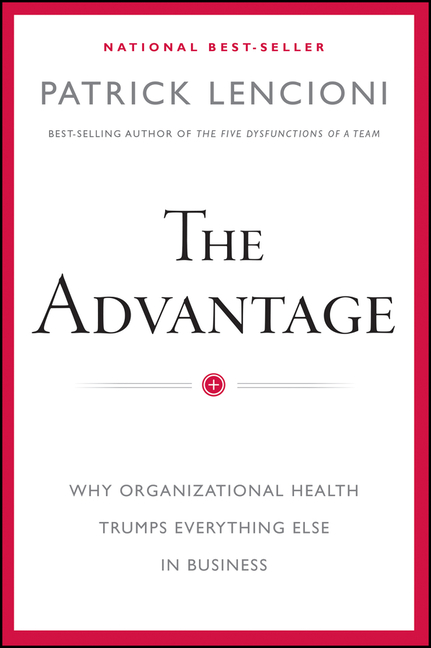Jack Covert Selects - The Advantage
April 13, 2012
The Advantage: Why Organizational Health Trumps Everything Else in Business by Patrick Lencioni, Jossey-Bass, 220 pages, $27. 95, Hardcover, March 2012, ISBN 9780470941522 This is a book many people may have been waiting for. Although Patrick Lencioni has established himself as an elite business book writer, he writes parables, and for some, fictional stories just don’t get to the point quickly enough or clearly detail the important steps, data, and analysis of a situation in order to change and improve it.

This is a book many people may have been waiting for. Although Patrick Lencioni has established himself as an elite business book writer, he writes parables, and for some, fictional stories just don't get to the point quickly enough or clearly detail the important steps, data, and analysis of a situation in order to change and improve it.
If that sounds like you, then you'll appreciate The Advantage: Why Organizational Health Trumps Everything Else in Business. The book is pure non-fiction, and begins by identifying the difference between smart and healthy companies. According to Lencioni, in order to be successful you have to be both, but many leaders focus only on the smart side of business—the clear, quantifiable data that can be adjusted to make improvements. What if that alone doesn't work?
Organizational health is more qualitative. Take culture, for instance. Funky furniture or company yoga classes don't make the culture. A company might say, "We're a great place to work because we have these things." Meanwhile, behind those things might be employees who don't feel aligned with the company's mission, connected to their coworkers, or passionate about their role. Those are the points that help develop and shape the culture, and this book describes in clear detail how to create better alignment throughout an organization. Soft? Hardly.
Here, Lencioni describes how an aligned team functions within a healthy organization:
Members of cohesive teams spend many hours working together on issues and topics that often don't fall directly within their formal areas of responsibility. They go to meetings to help their team members solve problems even when those problems have nothing to do with their departments. And perhaps most challenging of all, they enter into difficult, uncomfortable discussions, even bringing up thorny issues with colleagues about their shortcomings, in order to solve problems that might prevent the team from achieving its objectives. They do this even when they're tempted to avoid it all and go back to the relative safety of their offices to do what I refer to as their "day jobs," that is, the work of their department.Over the course of the book, Lencioni shows how this direction of focus creates an advantage over companies who focus on it less, or not at all. There are no characters in this book, no fictional situations about company ABC and the problems they face, but the lessons Lencioni is now famous for are still here. In fact, as you're reading, you might even develop your own characters and apply your own situations as you realize that Lencioni is fueling a script for your own story. The Advantage is another powerful book by a masterful writer that understands the importance and value of the human element within business.


